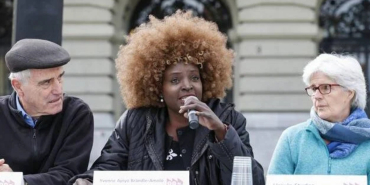Urgent Action Needed to Protect Kenyan Domestic Workers in the Gulf, Say Rights Groups

Human rights groups have sounded the alarm that not enough has been done to tackle the alleged mistreatment of domestic workers in Gulf nations after the Kenyan government moved in speed to secure employment opportunities for its citizens overseas.
No recent available data on Kenyan migrant worker fatalities exist, however, the nation's foreign ministry declares that at least 89 Kenyans, mostly domestic workers, died in Saudi Arabia from 2020 to 2021. Kituo cha Sheria and another rights association, Hakijamii, are supporting legal action against the Kenyan government, claiming that it has failed to take proper measures to protect Kenyan workers in gulf from "contemporary slavery and human trafficking".
In the suit, which was submitted in early February, the workers allege that the Kenyan government has overlooked the pressing need to investigate many instances of deaths and abuse. The Kenyan government will be required to present its response in the upcoming few months.
Saudi Arabia is a major source of remittances to Kenya. Migrant workers in the Middle East country supposedly sent about £237 million to their families in Kenya last year. Kenyan President William Ruto has put the issue of providing more employment opportunities, both domestically and abroad, at the forefront of his political agenda. He recently announced plans to sign several bilateral agreements, including with Germany, to give Kenyans the chance to work further afield in Europe, North America and the Middle East.
The inclusion of Saudi Arabia in this list, however, has been met with protests from rights groups who are worried that the mistreatment of domestic workers in the Gulf country has not been sufficiently addressed. In response, the organisation has launched a lawsuit asking for the immediate suspension of all labour migration to the Middle East until the government meets certain criteria and reparations for those who have suffered.














Comments
The Agents should be…
Permalink
The Agents should be Prosecuted for Luring and Endangering the Lives of Naive and Unsuspecting KENYAns.
The solution to these…
Permalink
The solution to these mistreatments is facing the -elephant in the room,so to speak.The Arab slave traders do not respect africans,and hold them in low esteem.To them africans are inferior,and only fit to be slaves.Yes,it is true that Arabs were heavily engaged in trading africans slaves way before the TransAtlantic slave trade stated.Even Mohammad their prophet traded in slaves,and also had sex slaves. Now given this backdrop, how in the world would anysome expect them to treat africans as' equals'?
Unfortunately the mistreatment of africans is heavely influence by their Islam religion,which does not paint anything black in good light.These are deeply rooted sentiments that would take generations to disappear,or ignore.Also compounding the problem is the whimply attitude our weak leaders have toward the Arabs.They seem to want to go along with anything the Arabs propose without input.And yes if these were wazungu domestic workers, we would be singing a diffrent song.Arabs adore the white skin.
Add new comment